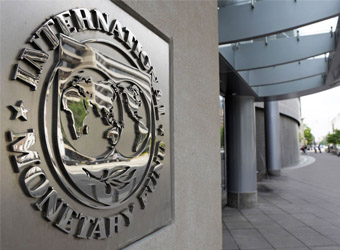Egypt is betting on aid from its oil-rich Gulf neighbors to spur its ailing economy, ending a two-year pursuit of an International Monetary Fund loan it had touted as vital to regaining investor confidence.
The government announced yesterday approval of a 22.3 billion Egyptian-pound ($3.2 billion) stimulus package after securing $12 billion in aid pledges from the Gulf last month. Egypt doesn’t “currently have the desire or the need to ask for assistance from the IMF,” Finance Minister Ahmed Galal said in a statement yesterday.
Saudi Arabia, the United Arab Emirates and Kuwait rushed to aid Egypt following the military’s ouster of the former President Mohamed Morsi July 3. Almost three years after Egypt’s 2011 revolt, the country’s economy is struggling with growth at just a third of the 6.2 percent it averaged in the last five years of former President Hosni Mubarak’s three-decades of rule.
Gulf aid “alleviates the risk of an immediate crisis,” William Jackson, London-based emerging-markets economist at Capital Economics Ltd., said by phone. In the longer term, the abandonment of IMF talks is “worrying, because it reduces the need for authorities to make painful reforms such as fiscal consolidation and allowing the pound to weaken to a more competitive level,” he said.
Battling Deficit
The government, battling a budget deficit that ballooned to 14 percent in the year to June from 11 percent a year earlier, says it’s considering economic reforms. Measures being studied include a value-added tax, limited tax exemptions for informal businesses to encourage registration, and widening the use of electronic cards to control distribution of subsidized fuel, Galal said.
Egypt’s benchmark $1 billion of 5.75-percent Eurobonds due in 2020 advanced, pushing the yield down 11 basis points to 8.93 percent at 6:33 p.m. in Cairo. That’s the lowest level on a closing basis in two weeks. The pound was little changed at 6.986 per dollar, having gained 0.6 percent since Morsi’s fall.
Political unrest has persisted after the military-backed government’s violent break-up of sit-ins in Cairo by Morsi supporters which left at least 1,000 people dead this month. Backers of Morsi are calling for another round of nationwide protests tomorrow.
The Muslim Brotherhood, the group that fielded Morsi for office, has endured its most severe crackdown in decades. The group’s top leaders, along with hundreds of other members, have been rounded up as the push against the Islamist organization elicited international criticism and talk of reviewing aid by some of Egypt’s closest allies, including the U.S. and the European Union.
Funds Arrive
Gulf funds, of which $5 billion arrived last month, helped replenish Egypt’s foreign-exchange reserves to $18.9 billion, the highest level in 20 months, and pare the decline of the Egyptian pound, which has dropped 11 percent since December.
Of the total sum pledged, $6 billion are interest-free deposits with the central bank that will be added to reserves, while $3 billion in grants will be invested in infrastructure projects, Galal said. The remaining $3 billion will be in the form of petroleum products to cover local demand.
The Finance Ministry’s head of debt management, Samy Khallaf, said in a phone interview yesterday there are “signs of further financial support” from Gulf nations.
Part of the money received will be invested in housing, education and health projects, Planning Minister Ashraf El Arabi said in a televised press conference yesterday. The government aims to boost economic growth to 3.5 percent in the current fiscal year from 2 percent in the year that ended in June, he said.
“Any money coming for the Gulf gives policy makers a bit more breathing space,” said Anthony Simond, London-based emerging markets investment analyst at Aberdeen Asset Management Plc. “I don’t think anyone expected an IMF agreement in the next year or so of the transition so spurring the economy is a necessity at this stage.”
Source: Bloomberg



